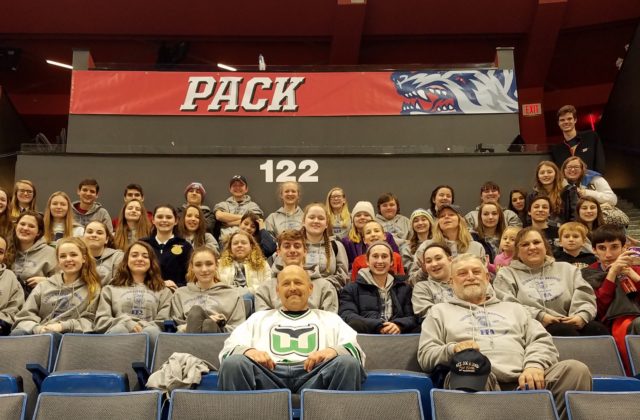Agricultural Education Program Provides Classroom Learning and Hands-On Skills
By Charlotte McDevitt
There are many different activities that students can participate in when entering Northwestern Regional 7, and some programs will benefit them throughout their lives. One example is the Agricultural Education Program, or Ag. There are three different parts of the Ag program: Class and Lab, FFA (Future Farmers of America) and SAEP (Supervised Agricultural Experience Program, or work experience).
Class and Lab teaches students about animal science, plant science, natural resources and Ag mechanics. There are also 14 additional courses, which range from Floral Design to Fisheries and Aquaculture.
The FFA is the largest youth leadership organization in the country. It serves students in many different ways, and the skills they learn will stay with them long after they leave school. The FFA helps students gain leadership and public-speaking skills, and gives them chances to compete in areas they are interested in. Some of these areas are Career Development Events (CDEs) and Leadership Development Events (LDEs). Topics for CDEs range from Forestry to Milk Quality and Products, while LDEs include Public Speaking, Ag Issues and Employment Skills.
To get academic credit, students must also have work experience, such as job shadowing, paid positions, or community service, which are all part of the SAEP component.
The Ag experience starts in seventh grade as a mandatory class. There is no Ag class in eighth grade, but starting in the fall of eighth grade, students can fill out an application for continuing in the program in their freshman year. Anyone who’s interested may fill out a form, and acceptance letters are usually sent out in late January or early February. Applications can be obtained from guidance counselors, on the school’s website (www.nwr7.com) or in the Ag office (you can call them at 860-379-9013).
Additional work required of students is to keep an online workbook or portfolio that logs their hours and documents new skills and information learned. Students create a resume and may apply for multiple scholarships and awards or degrees that are given in part on the basis of these records. They must also attend a monthly meeting after school that’s usually 45 minutes long. There are many other optional activities students can participate in, such as working shifts at the Ag booth at the Riverton Fair or the Big E and attending leadership conferences.
The three components mentioned above, Class and Lab, FFA and SAEP, educate students in the sciences and multicurricular areas, but labs also provide hands-on work experience that reinforces the lessons. According to Mia Haaland, Ag’s program director, being in FFA makes students more desirable for colleges and beyond, since the program teaches them leadership skills and confidence. When asked what he wants to get out of the Ag program, sophomore Alexander Adamson said he hoped “to get experience in the career field I want to go into.”
Students who have participated in Ag will graduate prepared for the workforce. Some will start their own businesses, but most will go on to college to further their Ag education.
Photo, courtesy of Regional 7: The Future Farmers of America and their supporters at Regional 7 attended a Hartford Wolfpack hockey game last February as part of National FFA Week celebrations.

